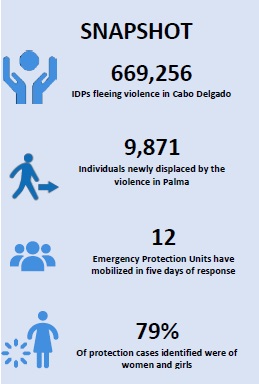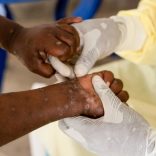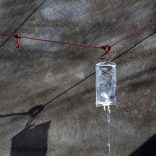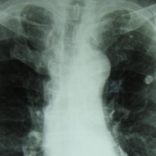Mozambique: Number of confirmed mpox cases rises to 17 - AIM report
Cabo Delgado | Mozambique Protection Cluster – Palma Flash Update #1 (5 April 2021)

Picture: UNHCR/Martim Gray Pereira
HIGHLIGHTS
- Absolute majority of the newly arrived are women and children.
- Thousands of individuals in Palma are still in need of access to safer areas.
- Reports indicate difficulties in accessing to asylum and refoulement of Mozambicans.
- Emergency Protection Units (EPUs) activated, combining joint action of members of the cluster to rapidly support urgent needs.
- PROTECTION CONTEXT
The recent attacks by Non-State Armed Groups (NSAG) to Palma has severely affected the local population, with reports of grave human rights violations, causing forced displacement. Reports collected by members of the Protection Cluster indicate that safe exit routes from Palma are almost non-existent. Road access to Tanzania (north) or Nangade District (west) are not deemed safe, forcing a difficult attempt through alternative routes in the countryside through the bush and forests. IDPs that reached Pemba sought safety at Afungi peninsula. Even so, IDPs reported that the NSAG specifically targeted civilians on-the-run, forcing them to hide, resulting in a long journey, which for some took days, until reaching Afungi, still considered safe. Once there, thousands of IDPs wait to be able to enter the area, in the hopes of being evacuated to reach safety in the south of Cabo Delgado.
The great majority is still there waiting for a possible evacuation. IDPs have arrived in safer areas of the province, such as Pemba and Mueda and reports also indicate cross-border movement into Tanzania; however, so far it is not possible to confirm numbers and the conditions of their arrivals in the neighboring country. In Pemba, IDPs arrived on boats from companies operating in Afungi Peninsula or on evacuation flights. Among the main protection issues identified, were family separation, unaccompanied minors, gender-based violence, single-women head of household with no family links in the areas of refuge, elderly, disabled and traumatized individuals in need of psychological support.
- PROTECTION RESPONSE
Emergency Protection Units (EPUs): the Protection Cluster has set up EPUs, which are groups composed by different partners (UN agencies and NGOs) with focus in four specific protection areas: general protection, gender-based violence (GBV), Child Protection and Mental Health and Psycho-Social Support (MHPSS). The units identify and refer cases for immediate prioritization and follow up. The units can be activated in less than one hour, allowing a coordinated and simultaneous presence in different sites. The EPUs are divided in two lines of response: (i) direct assistance to displaced individuals at the time of their arrival to Pemba, and (ii) case management and provision of services. The EPUs, in coordination with local authorities, supported the prioritization of vulnerable cases prior and after disembarking on boat and flight arrivals, identifying, and referring cases of individuals with specific needs, transporting to temporary accommodation centers and later working on case management and service provision. UNHCR, UNICEF, Save the Children, IOM, UNFPA, AVSI, Caritas and FAMOD worked in this initial phase of the response.
Gender-Based Violence: partners on the ground, such as UNHCR and UNFPA have been assessing GBV risks in accommodation centers as well as providing case management.
Disabilities: FAMOD has been present in disembarkation points at the port and airport with means of compensation to support access. In accommodation centers, cases have also been identified and referred by partners.
MHPSS: IOM has provided support for the identification of cases and psychological first aid. The Protection Cluster is also coordinating the response with the MHPSS Working Group. At the temporary accommodation shelter (Centro Desportivo), AVSI has deployed two psychologists who have been meeting with IDPs as a result of referrals of protection partners.
Prevention of Sexual Exploitation and Abuse (PSEA): in coordination with the Protection Cluster, the Cabo Delgado PSEA Network supported the promotion of a rapid orientation for all responders in the emergency. Information and awareness on PSEA and community-based complaints mechanism (CBCM) has been conducted in temporary accommodation centers.
Family Tracing: Save the Children, IOM and UNHCR are working in supporting the identification of family members, including unaccompanied minors. Families are coming to the temporary shelter hoping to find missed relatives.
Referral Pathways: The Protection Cluster has produced an emergency service mapping and referral pathways for the reception locations and Temporary Accommodation Centers, including core services, such as Protection case management, MHPSS, Health, Security, Shelter, Non-Food Items and Food Assistance.
Protection Monitoring: UNHCR is reporting key protection needs and identifying main protection issues.
Transport for persons with specific needs: Save the Children and UNICEF have supported those with specific needs, such as female head of households, persons with disabilities and unaccompanied and separated children.
- PROTECTION GAPS
Protection environment: thousands of individuals are still located in unsafe areas. Many of them displaced or in displacement.
Unaccompanied and separated children: the EPUs have identified children separated from their parents/care-givers due to the rapid nature of the attacks and of the evacuation process. These include child mothers and children with disabilities. The local shelter for children is crowded, partners are working to identify alternative solutions.
Gender-Based Violence (GBV): women and girls account for the majority of the newly arrived IDPs. The conditions of the attack and the escape to safer areas have potentially increased the risk of GBV. Increase case management and services are required.
Child Protection: there are concerns for children’s safety in temporary sites as well as safe space for children to conduct psycho-social support activities for those experiencing trauma. Partners are identifying alternative caregivers, however, foster care solution are overstretched.
Persons with disabilities: specific support and mainstreaming is needed. Many persons with disabilities have remained in affected areas, unable to flee because of challenges in reaching safety.
Lack of documentation: a great number of IDPs could not bring their civil-documents, which may result in the increase of their vulnerability and may prevent access to services.
MHPSS: the events in Palma have been described by IDPs as highly traumatic, particularly for IDP children. IDPs report that they have experienced atrocities, including against their own family members.
Elderly Persons at risk: In coordination with the Protection Cluster, the Forum for Elderly Persons (Forum da Terceira Idade) has sent activists into the Centro Desportivo to assess the needs of the elderly. Mobility issues have prevented many from reaching safe havens where they could be evacuated either by plane or by boat.
Access to asylum: some 600 individuals have been forcibly returned (refouled) from Tanzania after having crossed the border to seek international protection.
- KEY MESSAGES
International Protection: Access to asylum must be respected.
Family separation: To the possible extent, evacuations should consider family unity; similarly, accommodation in safer areas should ensure that families are not separated.
Targeting of civilians: The direct targeting of civilians, including children, is a grave violation of human rights.
Documentation: efforts must be mobilized to facilitate access to lost civil documentation (Mozambican ID) due to displacement.
- You may read, download, the full report HERE













Leave a Reply
Be the First to Comment!
You must be logged in to post a comment.
You must be logged in to post a comment.